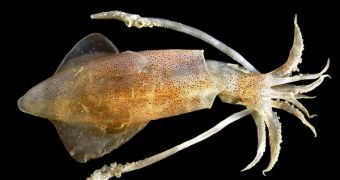The ink that squids squirt when they are scared or when they attack apparently acts as a warning signal for nearby squids as well. The mechanism is not different from the one fish use to escape danger. When a fish is bleeding, the others pick up the scent and disperse. Squids, however, use melanin, the active ingredient in their ink, to identify danger and evade it.
Marine animal behavior researchers at the Bermuda Institute of Ocean Sciences discovered that it wasn't the color of the ink that alerted squids of danger, but, instead, the chemical composition of the ink itself. To prove this, they scared a squid in an aquarium and then gathered some of its ink. They injected a part of it in another water tank with squids and they took evasive actions.
But when they removed the dark melanin coloring from the ink and injected it in other aquariums, the squids inside those tanks didn't react at all. James Wood, a marine biologist at the Institute, suspected for quite some time that it wasn't the color of the ink that tipped off other squids of the danger. He believed that because most squids are asocial and live in deep, dark waters, where there is little light available. No light means no color recognition.
Therefore, chemicals must be what alerts them, thought Wood. And he was right, as proven by the experiments he conducted on Caribbean reef squids (Sepioteuthis sepioidea), which are social animals, unlike other squid species. The scientist now wants to turn his attention to studying deep-water squids, in an attempt to determine exactly how they communicate among themselves when danger is imminent.
Underwater documentaries have proven that squids form groups only when faced with a common enemy. Their size and numbers can help them overcome most threats. But, regularly, they live alone and do not interact with each other outside the mating season. Wood now wants to find out why they form alliances that only last for short periods of time. Understanding the way they communicate and warn others may give scientists some potential clues in that direction.

 14 DAY TRIAL //
14 DAY TRIAL //